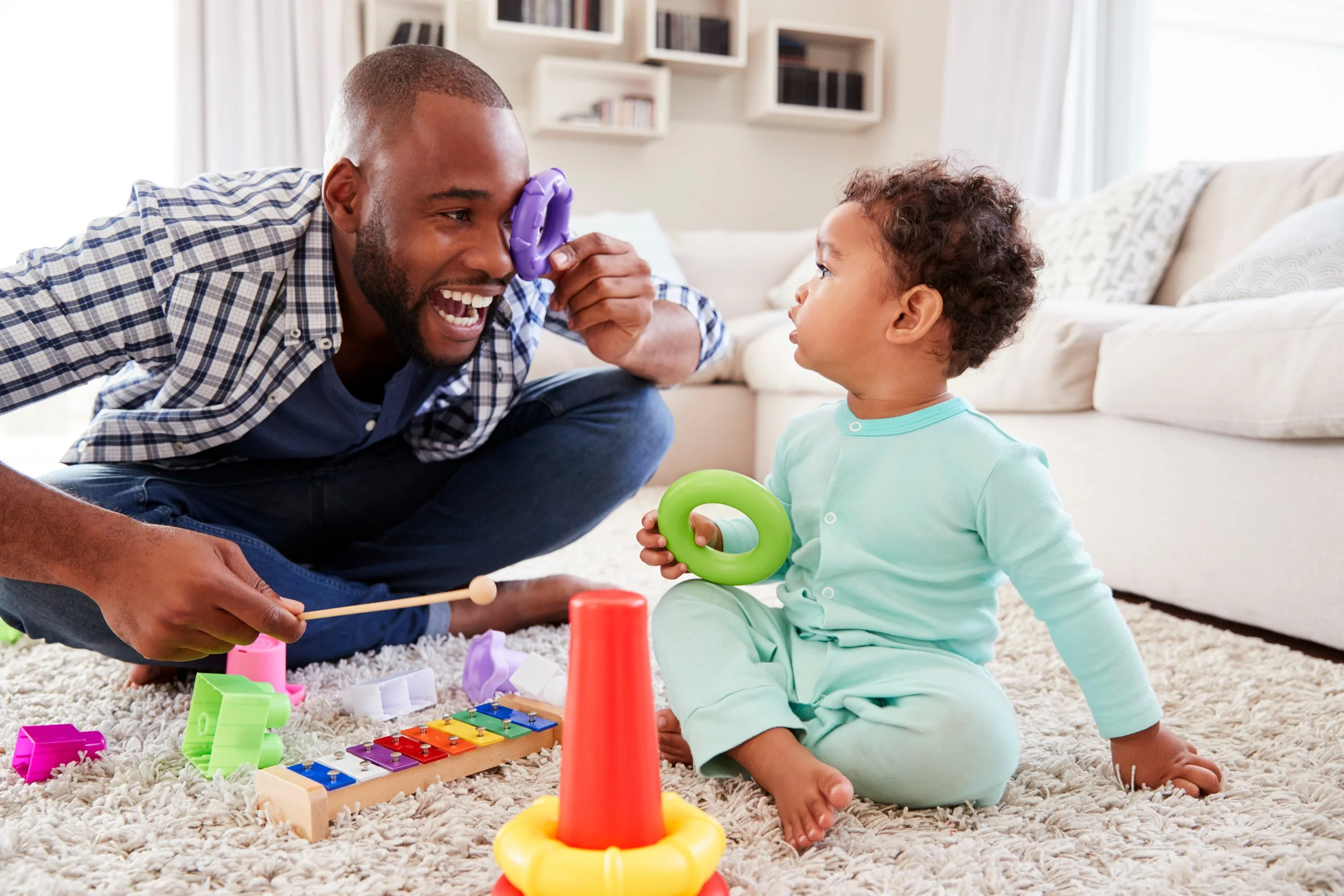Speech Therapy For Toddlers - What To Expect
Pediatric speech therapy supports children’s growing expression, understanding, and social communication skills. Speech therapy with toddlers will include play, practice, and homework activities. As a whole, it will improve a child’s speech and language development.
My toddler has their first speech therapy session soon, what should I expect?
If your toddler is about to have their first speech therapy session, you might have a lot of feelings. You might be worried that your child won’t want to participate and it will be a waste of time. Or maybe you are secretly anxious about what the therapist might say about your parenting. You may also be simply wondering what the session is going to be like. All these thoughts are normal and shared by many caregivers.
By the time the first speech therapy treatment session is scheduled, you have thankfully already gotten through a lot of the hurdles in the administrative process. You have gotten a referral for a speech evaluation, had the initial evaluation, gotten funding approved for speech therapy service, and have been scheduled. Please click here to read more about speech evaluations.
Where does speech therapy for toddlers happen?
For children under the age of three, speech therapy might happen in the home, at a clinic, or at a county-funded facility (sometimes located at a public school site.) The location of speech therapy for toddlers depends largely on what services are offered in your area and who is paying. Some funding sources do not pay for in-home speech therapy and you will only be offered clinic-based speech therapy. Additionally, you may be offered telehealth speech therapy from a provider at one of these sites.
Is my toddler’s speech therapy session going to be in a group or alone?
The therapist who evaluated your child the first time has recommended individual speech therapy, group speech therapy, or both. Which one is recommended depends largely on the child’s needs as well as what the facility offers. If the facility will be providing in-home speech services, obviously a group is not a possibility and hasn’t been recommended. Some insurance companies do not pay for group speech therapy. In any case, you should be made aware in advance what kind of session to expect. Click here for more information about group speech therapy.
Do I go back with my child during their therapy or wait in the waiting room?
Some clinics ask the parents to wait in the waiting room while the toddler is seen alone by the therapist, while others ask the parents to come back to the treatment room. I feel very very strongly that parents should be part of the therapy session. Was that emphasis obvious enough? Speech therapy for toddlers and preschoolers is a family affair. High-quality early intervention speech therapy should be viewed largely as a parent training session.
Since you, the primary caregiver, are with your child the most, you are going to make the biggest impact throughout the week. A therapist is not going to take your child in the back room for an hour a week and magically teach them to talk. Rather, YOU are going to be given specific tasks to practice during the week and the speech therapy session is the time when the therapist can model the techniques and give you some tips.
The therapist is the coach, but YOU are the athlete doing all the hard work. Kids don’t learn to talk in the therapy room per se, but rather all throughout the week when they are with you. In the case of telehealth speech therapy, caregiver participation is more important than ever.
Speech therapy for toddlers - What happens during the sessions?
Regardless of why your child is in speech therapy, whether it be a speech delay, language delay, or something else, the speech therapy session will usually follow the same agenda.
The therapist will greet your family in the waiting room, and then invite you to come back to the treatment area. In the therapy room, the therapist will have toys, games, books, and other enticing things. If therapy takes place in your home, you will invite the therapist in and they will bring some toys with them.
The first session will likely be a time when the therapist and you get to know each other. The therapist will try to make your child comfortable and probably won’t be very demanding in that first session. There will likely be some administrative things to take care of, and the therapist will probably be observing your child and asking questions to see what progress has been made since the initial evaluation. Your therapist should also review the speech therapy goals with you. Hopefully these have been written during the evaluation, but will likely be updated in the first few therapy sessions as the therapist gets to know your child better.
As you return for additional sessions, your child will become more familiar with the therapist and the facility and become more comfortable. In the session, the therapist will be trying out strategies to help your child talk. When they find something that works, they may have you take some turns trying the strategy. Then they will assign you homework to practice during the week.
So each session should include:
1) modeling/direct treatment
2) coaching/practice
3) homework
An experienced early intervention therapist will have all of these elements in their sessions. As parents become more experienced themselves implementing the strategies, there will be less coaching.
Example Speech Therapy - Toddler Session:
The therapist may be trying to have your child learn to sign MORE as a way to request. Let’s walk through an example interaction.
Modeling/ Direct Intervention: The therapist starts blowing bubbles, signing MORE each time before they blow. Eventually, they sign MORE and wait a few seconds to encourage your child to imitate. After a few tries, your child does imitate the MORE sign and the therapist immediately blows the bubbles as a reward. This continues for a while.
Coaching/Practice: The therapist hands you the bubbles so that you can continue the activity. The therapist coaches you about timing and how to make the MORE sign. Your child really likes blowing bubbles with you and is more motivated by you than the therapist because you are awesome.
Homework: You and the therapist discuss how you will continue to work on the MORE sign at home. You decide that you will practice at snack time every day while using gummies because those are very motivating for your child.
Here’s another example of a speech therapy strategy you may practice in speech therapy session and use in your speech therapy homework:
I’m nervous about being coached. I feel like I must not be a good parent because someone has to tell me what to do.
You are a good parent. Seriously, you are!
There is nothing wrong with the way you talk to and play with your child. BUT some kids are quirky and they don’t learn to talk as fast through the regular way that people talk to them. A therapist has a whole bunch of ways to get kids to say something and grow their language skills. The therapist is going to teach you those tricks.
So don’t think of being coached as the therapist correcting your parenting. Your parenting is fine. Rather, they are teaching you special techniques that you didn’t think of on your own. You learning these techniques will help you teach your child to talk.
What if my child is shy and doesn’t participate during the speech therapy session?
I have seen it all: the child who sits silently hiding their face in their mom’s shoulder the entire session, the child who cries the whole time because they think they are getting a shot, the child who is asleep in the stroller and then loses it when they wake up.
I once had a toddler walk in the room and immediately fall asleep while standing up. Another time a child started panic-crying when I pulled out a toy shopping cart because he had a shopping cart phobia I didn’t know about. Explosive diapers, crying siblings, hunger, being upset because a parent is deployed… there are a million reasons why a therapy session doesn’t go well. BUT the therapy session is only a small part of your child’s week. If they are slow to warm up, it’s okay because a good therapist should be interacting with YOU. The therapist can still model play techniques, coach you, and develop a home program even with a child tantruming on the floor.
Don’t be embarrassed if your child is not a superstar in the therapy room, because an experienced therapist won’t bat an eye. They have probably seen worse!
My child doesn’t really like the speech therapist, what should I do?
Not all personalities go together. Each therapist has their own style and it is best when their style compliments yours. In short, try it for at least 4 sessions. Discuss with the therapist what your concerns are and what is not going well, giving them a chance to adapt and try something else.
If you are still having reservations, you can ultimately request a different therapist. For more information about therapist issues click here.
Speech therapy for toddlers is fun and will help your whole family when communicating. Remember:
Speech therapy for toddlers might happen at a clinic, your home, a therapy center, or even telehealth (see Speech Therapy and COVID-19 below)
Speech therapy for toddlers should include parent participation
A speech therapy session includes modeling/direct therapy, parent coaching, and homework
Speech Therapy and COVID-19
Like everything globally, speech therapy has shifted slightly to accommodate the health and safety concerns associated with COVID-19. Some changes you might see to your speech therapy session include:
Increase in cleaning of toys as well as more limited use of toys
Limits to the number of people/siblings who can come to the therapy session
Health screenings at the entrance of the building
Therapist, staff, caregivers, and sometimes children required to wear masks
Therapy sessions being conducted via telehealth (Learn more about the pros and cons of online speech therapy here).
Here are some other questions that parents often ask about pediatric speech therapy for toddlers:
-
Speech therapy is designed to help toddlers learn to talk. Speech therapists are experts in finding the best strategies, activities, and goals for each child.
Working with a speech therapist to create and implement a systematic plan for your toddler’s development is one of the best ways to help toddler’s learn to talk.
-
The best way to help a 2 year old with speech therapy is to practice for 10 to 30 minutes of speech therapy each day at home. That’s why assigning and practicing your speech “homework” is such an important part of your toddler’s speech therapy session.
Your toddler’s speech therapist will help choose the best skills for you to practice at home. They will also help you learn to use proven speech therapy techniques to teach those skills during an activity your 2 year old enjoys.
Toddlers learn through repeated practice. Put simply, the more opportunities they have to practice a new skill, the faster they will master it. So the best way to help your 2 year old (or 1 year old) with speech therapy is to practice regularly at home.
-
If you notice that your child is missing one or more of their speech and language developmental milestones, it is a good time to consider speech therapy. Speech therapy sessions for toddlers are designed to support toddlers in meeting their speech and language milestones.
To learn more about speech and language milestones throughout toddlerhood, check out one of of free Communication Milestones Checklists:
Written By:
Stephanie Burgener-Vader, MA CCC-SLP
© 2020-2025. Stephanie Keffer Hatleli, MS CCC-SLP. All Rights Reserved.
The content offered on ToddlerTalk.com is for informational purposes only. Toddler Talk is not engaged in rendering professional advice, whether medical or otherwise, to individual users or their children or families. No content on this site, regardless of date, should ever be used as a substitute for direct medical advice from your doctor, speech language pathologist, or other health professional. By accessing the content on ToddlerTalk.com, you acknowledge and agree that you are accepting the responsibility for your child’s health and well-being. In return for providing you with information related to home speech and language practice, you waive any claims that you or your child may have as a result of utilizing the content on ToddlerTalk.com.







